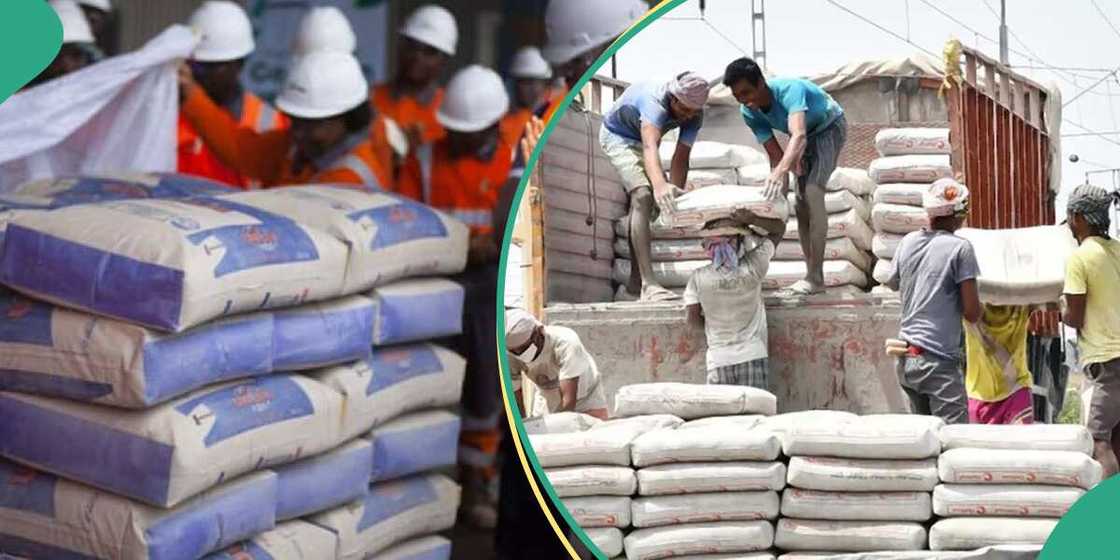N11,000/50kg Bag: Forex, Transportation Costs, Other Factors Responsible for High Cement Prices
- Nigerians have lamented the sudden hike in the prices of cement in the country in the last few months
- The hike in cement prices has heightened the cost of building and worsened housing availability
- Some of the reasons for the hike include fluctuating forex rates, demand and supply dynamics, high energy costs and others
PAY ATTENTION: The 2024 Business Leaders Awards Present Entrepreneurs that Change Nigeria for the Better. Check out their Stories!
Legit.ng journalist Victor Enengedi has over a decade's experience covering Energy, MSMEs, Technology and the stock market.
In 2024, the cost of cement in Nigeria has surged dramatically, surprising numerous retailers and consumers alike.
Presently, the official retail price for a bag of cement ranges from N8,000 to N11,000, despite an earlier range set by the federal government in efforts to mitigate building material expenses.
This sudden escalation in cement prices has significantly disrupted construction timelines and has had far-reaching effects across multiple sectors.

Source: UGC
Construction projects, vital for infrastructure development, now face increased costs, potentially stalling progress or inflating budgets.
Housing affordability has worsened, exacerbating the already challenging situation for low-income families.
Industries relying on cement, such as real estate, are now feeling a strain, potentially leading to reduced investment and employment.
In Nigeria, various cement brands offer their 50kg bags at differing prices. Renowned brands like Dangote, Lafarge, Ibeto, BUA, and UNICEM maintain similar pricing structures.
Ibeto and BUA Cement stand out as the most affordable options, followed by Dangote Cement at a moderate price point, with UNICEM and Lafarge Cement commanding higher prices.
Fluctuations in cement prices in Nigeria
The dynamic shifts in cement prices within Nigeria, akin to global markets, result from myriad interconnected factors. These determinants encompass:

Read also
Cement prices drop, report shows states with cheapest costs as seller refunds N400K to customer
Demand and Supply: The pricing of cement in Nigeria mirrors standard market dynamics of demand and supply. Increased demand from infrastructure projects, construction activities, or housing development, coupled with inadequate supply, typically leads to price hikes. Conversely, reduced demand or an oversupply scenario tends to drive prices down
Exchange Rates: Given Nigeria's reliance on imported raw materials, fluctuations in exchange rates wield significant influence over import costs, consequently impacting local cement prices. Should the local currency depreciate against foreign currencies, the expenses associated with imported raw materials could escalate, thus driving up domestic cement prices.
Chris Ugba, an economist, told Legit.ng that Foreign exchange rates have a significant impact on the price of cement in Nigeria.
He said:
"As the majority of cement raw materials are imported, fluctuations in exchange rates directly influence production costs. When the local currency weakens against major currencies, the cost of importing raw materials rises, leading to higher production expenses, which are then passed on to consumers through increased cement prices."
Transportation Costs: The weight and bulkiness of cement make transportation expenses a key determinant of its final retail price. Elevated fuel prices or logistical hurdles can amplify transportation costs, potentially leading to high prices for consumers as these additional expenses are often passed down.
Raw Material Costs: Cement production relies on materials like limestone, clay, gypsum, and fuel, the prices of which can sway overall cement costs. Should the expenses associated with these inputs surge, cement manufacturers might recalibrate prices to reflect the heightened production costs.
Energy Costs: Energy constitutes a substantial expense in cement manufacturing. Fluctuations in energy prices can directly influence production costs, potentially prompting adjustments in cement prices to accommodate these shifts.
Government Policies and Taxes: Government regulations, import duties, and taxes imposed on cement production and sales play a pivotal role in shaping the cost framework and subsequently impacting the retail price of cement in Nigeria. Alterations in these policies have the potential to induce fluctuations in cement prices.
Tochukwu Nwankwo, a research analyst with Bluetick Investments, told Legit.ng:
"Policies related to taxation and subsidies influence the overall cost structure for cement manufacturers, ultimately affecting consumer prices. Fluctuations in these policies can lead to adjustments in cement pricing to accommodate changes in operating expenses."
It is crucial to acknowledge that these elements intertwine and can exert a multifaceted and ever-changing influence on cement prices within Nigeria.
Consequently, the cement sector is susceptible to variations, leading to potential price fluctuations over short and extended periods.
Builders ask FG to slash cement price
In related news, Legit.ng reported that the Lagos chapter of the Nigerian Institute of Building called on the federal government to intervene and lower the cement price in the country.
The institute stated this at a briefing in Lagos state ahead of its 32nd builders conference tagged "Safe and Sustainable Building Production Management."

Read also
Marketers speaks on dollar payment for petrol transactions as sale of cheap fuel is set to commence
They attributed the skyrocketing cement prices to poor foreign exchange, adding that this had taken a toll on producers.
PAY ATTENTION: Donate to Legit Charity on Patreon. Your support matters!
Source: Legit.ng





